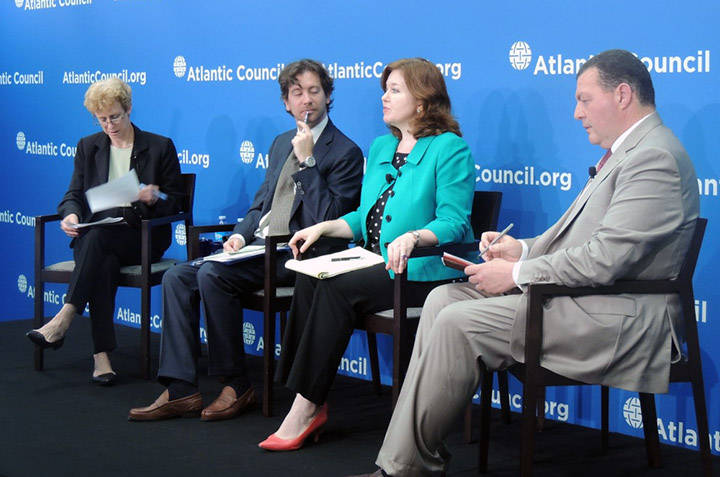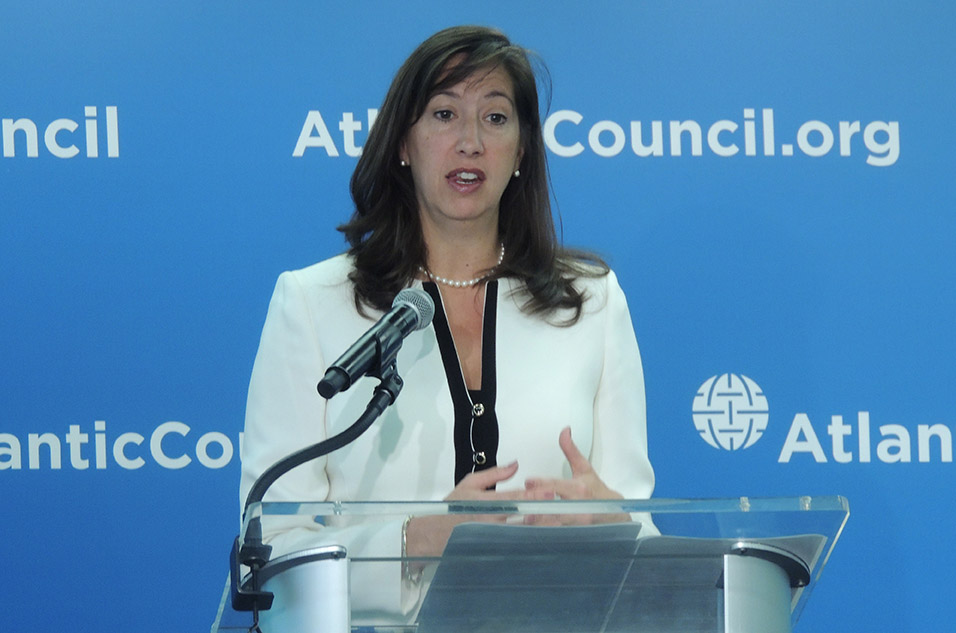 Tunisia’s democratic transition and economic growth can lead to security and stability in a volatile neighborhood, according to a US government official.
Tunisia’s democratic transition and economic growth can lead to security and stability in a volatile neighborhood, according to a US government official.
“A successful Tunisia benefits not only the Tunisian people but enhances security, prosperity, and influence in the region as well,” Paige Alexander, assistant administrator for the Bureau for the Middle East at the US Agency for International Development, said at an event hosted by the Atlantic Council on June 7.
“Working together [with Europe], it’s critical that we ensure that both the Tunisian economy and the political system continue to thrive,” she added.
Nicholas Westcott, managing director at European External Action Service, also gave remarks following which Andrea Gamba, an economist at the International Monetary Fund; Amy Hawthorne, deputy director for research at the Project on Middle East Democracy; and Karim Mezran, senior fellow at the Atlantic Council’s Rafik Hariri Center for the Middle East, participated in a panel discussion. Fran Burwell, vice president for European Union and Special Initiatives at the Atlantic Council, moderated the discussion.
Burwell, Mezran, and Hawthorne authored an Atlantic Council report titled A Transatlantic Strategy for a Democratic Tunisia, which details how the United States and Europe can build a transatlantic agenda to support a sustainable democratic transition in Tunisia. Elissa Miller, a program assistant at the Council’s Rafik Hariri Center, also contributed to the report.
With its Jasmine Revolution in 2011, Tunisia became the catalyst for the Arab Spring—a transnational revolutionary movement that spread across other countries in the Middle East and North Africa, including Libya, Egypt, Yemen, Bahrain, and Syria.
In Tunisia, the Ennahda political party assumed power in January 2011 after the revolution, which resulted in the ouster of longtime leader Zine El Abidine Ben Ali, calmed under a moderate Islamist platform. At a party conference held in May of this year, Ennahda officially distanced itself from its Islamist base and adopted a more secular approach to government operations.
Ennahda’s civic pivot away from its Islamist roots has seemingly paved a path for economic development and international investment in the North African country. On June 3, the United States and Tunisia agreed on a $500-million loan guarantee program—the third of its kind—that seeks to boost economic reforms and multinational investment in Tunisia.
“This [third sovereign loan guarantee] is monumental in the fact that it gives access to an additional $500 million in international private finance [programs]…together, these three loan guarantees have unlocked almost $1 billion in financing to help the Tunisian government reform and revamp its economy,” said Alexander.
Along with its European partners, USAID is facilitating Tunisia’s municipal elections that are scheduled for later this year.
“Our democracy activities will focus on local governments with special emphasis on empowering marginalized communities. We will support the first-ever, pivotal local elections next year. Local politicians, civil society organizations, and general citizenry will be playing their respective roles for the first time in this undertaking,” said Alexander.
 “A successful Tunisia benefits not only the Tunisian people but enhances security, prosperity, and influence in the region as well,” said Paige Alexander, assistant administrator for the Bureau for the Middle East at the US Agency for International Development. (Atlantic Council/Kari Frentzel)
“A successful Tunisia benefits not only the Tunisian people but enhances security, prosperity, and influence in the region as well,” said Paige Alexander, assistant administrator for the Bureau for the Middle East at the US Agency for International Development. (Atlantic Council/Kari Frentzel)
Even though economic and democratic goals are being met, regional instability and terrorist networks, such as the Islamic State of Syria and al-Sham (ISIS) that operate out of Libya, Tunisia’s eastern neighbor, pose a threat to institutional stability in Tunisia.
“The spillover from Libya has greatly imperiled Tunisia’s tourism sector. [The United States and Europe] have to help Tunisia face that security challenge,” said Westcott.
ISIS carried out three attacks directed at tourists—mainly European nationals—in 2015. Seventy-four people died from the three ISIS-sponsored terrorist attacks at the Bardo National Museum, Sousse beach, and in the capital Tunis.
“The threat and spillover from Libya pose real threats to Tunisia’s economic progress but Tunisia’s radicalization and terrorism problem is primarily homegrown,” said Hawthorne. “The international community is not giving enough attention to the social, economic, and political conditions that are contributing to the very complex phenomenon of why so many young Tunisians are attracted to groups like ISIS.”
Supporting youth employment, job creation, vocational training, and entrepreneurship are seen as critical to ensuring security, stability, and effective countering of violent extremism in Tunisia.
“Since USAID has reengaged with Tunisia in 2012, we have created 14,200 stable and sustainable jobs for young Tunisians and they have formed as a direct result of USAID’s economic growth program. Over the next year, we expect to create over 6,500 jobs,” noted Alexander.
Time will tell how continued instability in the region—particularly stemming from Libya—will affect Tunisia’s goals of achieving democratic and economic strength.
“We really need to focus on getting the economy right, but we don’t want to do so at the expense of walking away from democratic transition,” said Alexander.
“Tunisia has made impressive strides in the last five years, but we recognize there is still a long way to go,” she added.
Mitch Hulse is an editorial assistant at the Atlantic Council. You can follow him on Twitter @mitchhulse.
Image: From left: Fran Burwell, vice president for European Union and Special Initiatives at the Atlantic Council, moderated a panel discussion with Andrea Gamba, an economist at the International Monetary Fund; Amy Hawthorne, deputy director for research at the Project on Middle East Democracy; and Karim Mezran, senior fellow at the Atlantic Council’s Rafik Hariri Center for the Middle East, at the Atlantic Council on June 7. (Atlantic Council/Kari Frentzel)

